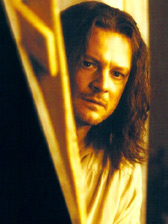
Profile & Interview: Colin Firth
by Carlo Cavagna
LEFT: Colin Firth hard at work as Dutch master Johannes Vermeer in Girl with a Pearl Earring.
 |
Profile & Interview: Colin Firth by Carlo Cavagna
LEFT: Colin Firth hard at work as Dutch master Johannes Vermeer in Girl with a Pearl Earring.
|
|
![]() s Colin Firth a big star yet?
s Colin Firth a big star yet?
He certainly is to women who watched him portray Mr. Darcy in the 1995 Price and Prejudice miniseries co-produced by A&E and the BBC in 1995. Reserved yet passionate, prideful yet charismatic, stubborn yet tender, and full of yearning—Firth knits the contradictory qualities of the brooding Jane Austen hero into a seamless, indelible whole, helping to make the miniseries the best-ever screen adaptation of a Jane Austen novel.
Firth had been around for several years already before Pride & Prejudice made him a household name in the United Kingdom. He got his start on the London stage with Rupert Everett in the West End production of Julian Mitchell's Another Country and then starred in the film version. Later, he earned a BAFTA nomination for the television production Tumbledown (1989). Pride and Prejudice, however, launched Firth's career, something of which he remains well aware and has even complained about obliquely, telling The Observer, “I felt as if I'd lost my whole personality. It's been very strange, this idea of Mr. Darcy appealing so much to women… I don't carry that around with me. I'm not so Mr. Darcy every day of my life. If people expect to see a saturnine, dark, smoldering tall aristocrat, they are going to be disappointed.” (William Leith, “Interview with Colin Firth” (April 9, 2000)).
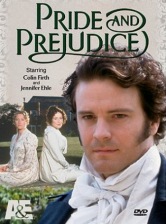 Colin Firth dominates the cover of the DVD edition of Pride & Prejudice, even though Jennifer Ehle (on the right) is the protagonist. |
One of the female fans Firth-as-Darcy won over was author Helen Fielding. Firth became an object of desire and obsession for her heroine, Bridget Jones. Fielding even named one of the rivals for Bridget's attentions after Darcy, and modeled their love story on the Austen romance. With the film adaptation of Bridget Jones's Diary, Fielding and the producers took it one step further. They recruited Firth to play opposite Renée Zellwegger, making the parallel complete.
Apart from his twin Darcy roles, however, the 43-year-old Firth has remained little known to U.S. audiences. He's been seen, of course—as the title character in Milos Forman's Valmont in (1989), with Minnie Driver and Chris O'Donnell in Circle of Friends (1995), and even in a couple Best Picture winners—The English Patient (as Kristin Scott Thomas's betrayed husband) and Shakespeare in Love (as Lord Wessex, Gwyneth Paltrow's intended). However, he hasn't been really noticed over here, and so Firth has continued to toil in the UK, where he has solidified his stardom with lead roles in films like Nick Hornby's first screen adaptation Fever Pitch (1997), Hugh Hudson's My Life So Far (1999), a television adaptation of Henry James's The Turn of the Screw (1999), and Oliver Parker's The Importance of Being Earnest (2002), which re-united him with Everett.
Firth's star is finally rising in the United States, though. Americans may not go as much as the Brits do for costumed miniseries like Pride & Prejudice, but they flocked to see Bridget Jones. In addition to that movie, 2001 also saw an Emmy nomination for a supporting role in TV's Conspiracy with Kenneth Branagh and Stanley Tucci, a retelling of the 1942 Wannasse conference where Hitler's “Final Solution” was devised. Early in 2003, Firth was introduced to a new generation of moviegoers as Amanda Bynes' father in What a Girl Wants. Despite being a trifling coming-of-age story heavy on musical montages, the movie made good use of Firth's knack for reserved characters who gradually warm. Then came a key part in the Richard Curtis comedy Love Actually, in which Firth falls in love with a Portuguese housekeeper who doesn't speak a word of English—again making use of Firth's non-verbal skills, as well as his underrated comedic abilities. Coming up soon is a starring role in Trauma, as a man who wakes up from a coma to find his wife has died. And, of course, he's in the midst of shooting the sequel to Bridget Jones.
The 2003 film that best showcases Firth's abilities is Girl with a Pearl Earring, currently in theaters and boasting three Oscar nominations. In it, a bewigged Firth is the mysterious 17th -Century Dutch Master Johannes Vermeer, whose attention is caught by a housemaid named Griet (Scarlett Johansson). Though Vermeer is written as an enigma, reserved characters are what Firth does best. He is able to communicate the complex emotions he comes to feel for the girl without betraying that reserve. The audience learns to see Griet as Vermeer sees her, with tenderness and understanding, and with a painter's eye. Despite their very different social stations, they form a rapport, and Griet becomes the subject of Vermeer's masterpiece. The film's climactic scene magically captures the artistic moment—that inexplicable converging of emotions and events when something miraculous occurs.
Last fall, Firth came to Los Angeles to promote Girl with a Pearl Earring . AboutFilm caught up with him in a roundtable interview, where he discussed the film, his friendship with novelists Fielding and Nick Hornby (High Fidelity, About a Boy), and whether he prefers Renée Zellwegger when she's “a bit squishier.” But, in spite of his recent successes and the fact that he will always be Mr. Darcy to millions of women, he still doesn't think he is a star.
[Read the AboutFilm review of Girl with a Pearl Earring]
Question: You've been doing a lot of press for this film. What has been the main topic of conversation?
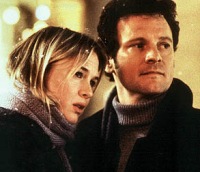 Renée Zellwegger and Colin Firth star in Bridget Jones's Diary. |
Firth: I suppose it's remarking on how little dialogue there is in the film, which I hadn't really noticed until everyone was saying it, funnily enough.
Question: You didn't notice it at the time?
Firth: No, at the time, I thought there was too much. I was all for— We were just taking out lines wherever we could, so I'm not surprised people think it's so quiet. I think it's far too chatty.
Question: The girl is the center of the film, rather than Vermeer. It's told from her point of view. Vermeer isn't really explained—he's a mystery. How, then, did you find your own way of interpreting him?
Firth: Yeah, that was the job at hand. I found it very difficult to find my way of interpreting him, really, because there was no clear path to making a decision. I had to just think it up. I had clues in the book. I had clues, obviously, in the script. There were very few clues in any documented history. [pauses] When I found that I'd clearly failed to arrive at a clear impression of who he might have been, I just had to make my own choice, and then not be too explicit about it, because as you've just said, it's not the business of this particular story to either explain things from his point of view, or to be too clear about him and what motivates him. I think there has to be a bit of a veil drawn over that, really.
AboutFilm Question: Scarlett Johanssen and Peter Webber have said that they avoided the book beforehand, but you read it. Why did you adopt a different approach?
Firth: Well, because I was looking for clues. I mean, I think if [my character had been written] in first person, I would have been more reluctant to read the book, perhaps. I wasn't. I felt like I'd been written from a distance. There's nothing wrong with that; Jane Austen does that with her male characters as well, and if an actor's going to flesh that out, it's up to them to turn the objective into the subjective. That's what I was doing. I just wanted to see if it was helpful. I wanted to see if it clarified things. I wanted to see if where the script was silent, the book wasn't, and what the subtext might have been. I wanted to see if certain bits of dialogue that I had questions about were from [novelist] Tracy [Chevalier]. I was curious. And I didn't feel that it was going to interfere with anything I might do with it. I found the book extremely helpful on most of those fronts. I found that Tracy Chevalier [had written] what I had already suspected about the character, which is that it was very much to do with his ways of seeing. Again, she would only have been able to write Griet's perception of his ways of seeing. I couldn't act looks; that's not what I do. It doesn't work. I just tried to be someone who watches, who is engaged with the visual world.
The benefit of having artists like Vermeer in the world is that he saw the world in a way that no one else did. He clearly and truly did…and the way he treated he treated depth and texture was unique. And you know, because we've got those paintings, we can see like he sees. That was useful for me as actor. They did become hooks, in a way. I thought, “Well, he's got this character that he's put in the middle of a picture, and he's chosen to distance himself from her, and he's chosen to put a table in front, between himself and her.” There seems to be a kind of reluctance for intimacy and yet an extraordinary passion. All these things, if you want, you can read into these pictures. I found those helpful, because if I have to stand silently and look at my subject—and that's my job in the role—I had that model for it.
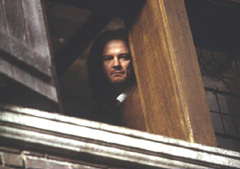 As Johannes Vermeer, Colin Firth peers out of his studio in Girl with a Pearl Earring. |
Question: How do you interpret Vermeer's relationship with his wife Catharina?
Firth: I think their marriage is in many ways pretty solid. Obviously there is plenty of action going on, with fifteen children.
AboutFilm Question: She must have been perpetually pregnant.
Firth: Well, she would have been, yeah. You know, some of those children died. The whole life cycle was pretty evident in their house. They lived through plagues and wars, and seemingly endless childbirth. I think our story and history divert, probably, to some extent. Certainly, what my suspicions are, I think that Vermeer is quite unlikely to have banned his wife from his studio. I think it's entirely likely that many of the models in his own paintings are her.
Question: I have read that some people have thought that she was the model for "Woman with a Pearl Necklace," the blonde woman.
Firth: Yes. And "The Lacemaker." The "Girl with a Pearl Earring" might have been his daughter, for instance. But, they look pregnant, some of these women, and as we've just said, this woman would have been almost permanently pregnant. And [also] you can identify some of the models as being apparently the same. There's a woman writing a letter looking out with a very particular expression, a real twinkle on her face, and she looks out of the painting ["Lady Writing a Letter"]. She's writing a letter, and she looks up. She's wearing the ubiquitous yellow thing with the fur. I think that might be Catharina. [But] it doesn't matter. It doesn't make any difference whatsoever. We are doing a fiction with its own integrity, and that's the thing I'm prepared to be loyal to. So if we're commenting on the relationship with his wife in our story, I think it's sexually alive. I think that he is devoted to his family. I think that he's very, very rooted in the social order of his day. And I think there must have been very strong reasons for his wanting to marry her. He changed his religion—he converted from Protestantism to Catholicism. Even though Holland was relatively tolerant in those days, it wouldn't have been an easy thing to do at all. And [he] moved into the house with his mother in law. These are all challenges I would image, so I would think there's quite a lot of passion there.
Question: Wasn't Catharina's family wealthy? She was wealthier than he was.
Firth: Yes, she was. He was the son of an innkeeper, and his grandfather was imprisoned for currency counterfeiting. He came from a rather ropy background. I mean, he was middle class as well, but she— Maria Timms had money. Catharina's mother had money.
Question: Let's switch gears a little bit. So much is made of Bridget Jones's character being overweight, and I personally think Renée Zellwegger looks gorgeous. Do you have an opinion about that?
Firth: Yeah, I totally agree with you. I think, no, she looks fine when she drops the weight, too, but I kind of like her—you know—a little bit squishier. [laughter]
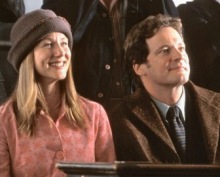 Colin Firth with Laura Linney in Richard Curtis's Love Actually. |
Question: Do you find it a little shallow that Americans' perception is that—
Firth: It's not just America, it's everywhere. It really is. I mean I find it absolutely astonishing that a woman puts on half a pound, and the world's paparazzi follow her everywhere trying to take pictures of her bottom.
Question: You don't think it's worse here?
Firth: No. No, I think if anything it's probably worse in England.
Question: Can you tell us a little bit about the Love Actually set, with so many superstars running around?
Firth: Well they weren't, you see, when I was in the south of France in that cottage. There weren't any superstars running around. There were two days when we shot the finale at the airport where we were all there, and yes, it was extraordinary, really. It was an implausibly large number of big names all together. The read-through, too, was rather like arriving at a film premiere or something. It was just a little bit overwhelming. It was comical, really. You couldn't look up without seeing some extremely famous person. But, no, I felt I had this sweet little pastoral film in France all to myself, with Lúcia [Moniz]. It was just slightly disillusioning to show up at the press junket and realize that all these other much more famous people thought it was their film.
Question: It was a good wrap party, though, right?
Firth: Was there a good wrap party? [pauses] No, I was mixing paints in Luxembourg by then. I couldn't go the wrap party.
Question: Did you read Bridget Jones's Diary before you filmed it? It has references to you. It was written for you, right?
Firth: What, you mean the role? I get lost in this. No, I read it kind of piecemeal. I don't think I ever sat down and read the book cover to cover, because it just didn't happen like that. Yes, Helen does say that when she was writing Mark Darcy, she had me in mind. But [Bridget Jones] started as a column in the newspaper, and I'd seen it because I would read that newspaper, but I never read Bridget Jones. I didn't know what it was. And then I was told that I'd been mentioned in it last week, and that this was beginning to become a regular occurrence. And I met Helen Fielding. She came to meet me on a film set, and then the whole encounter was written up in next week's “Bridget Jones's Diary.” Fictionalized, because Helen is not Bridget, but she found ways to spin it. It was given a comic turn—it wasn't how I remembered it at all. [laughs] She wrote that she'd been blindly following me around the set, which I don't remember her doing, and she almost followed me into the men's toilet, and I had turned around and said, “I think I'm going to have to go on alone from here.” This is how she worked it up. She swears this actually happened, but I don't remember.
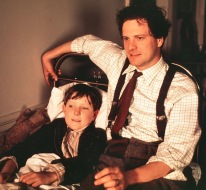 Colin Firth stars in My Life So Far. |
And then it was put together as book. I don't think I read the book at that time. I think I felt I'd read it all in columns, anyway. And then she flew to Rome and we acted out the interview that appears in the second book. She very generously included me in the editing process of that. She faxed me a transcript and asked for suggestions—got my input basically. Then that became a book. It was only after all of this, really, that the idea of a film started to come up. I thought it would be extremely unlikely, partly because I didn't think it possible that this particular kind of comic literary voice could be easily translated into film. Because it wasn't gag dependent. I thought it was cumulative in its effect, and it would be very hard to transpose that. And it grew and grew. The film was going to be a tiny thing at one point. It was going to be a little tiny independent thing that no one would really take much interest [in], or certainly wouldn't finance.
AboutFilm Question: Even with Richard Curtis writing it?
Firth: Well it wasn't Richard Curtis writing it. That came very late. This was Helen Fielding's idea to do something. I'd run into her every so often socially. “Do you mind me mentioning?” she'd say. “I did this thing the other day where I mentioned I'd like you to play that part. Do you mind me saying that?” And I said, “No, it's fine. You can say you'd like me to play the part.” [laughs] I ran into Nick Hornby, who said, “You realize that Helen has taken that as an absolute commitment that you will not take any other jobs for the next five years.” Then to my amazement it became real, and it started to grow in stature. And yes, elements like Richard and Hugh [Grant] and Renée made it into something far bigger than any of us had imagined.
AboutFilm Question : You've also done a Nick Hornby adaptation, haven't you? Fever Pitch?
Firth: I did his first, actually. You would never know about it in the States. It didn't come out here. I think it's one of those things they're going to remake, because it's about soccer. That was one of the reasons they just felt, you know—“No stars in it, and it's about soccer.” So, I think what they're going to do is put stars in it and have it be about baseball.
Question: Why don't you do the remake?
Firth: No, I think I'm still not famous enough for what they want.
AboutFilm Question: That's changing now, isn't it?
Firth: Well. Don't know about baseball.
Question: What about [Hornby's] How to be Good ? Do you think that will be adapted?
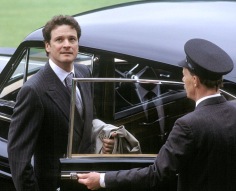 Colin Firth stars as Amanda Bynes' long-lost father in the teen coming-of-age story What a Girl Wants. |
Firth: I think it could be a film. I think it's less obviously so. Mind you, Fever Pitch was not even a fiction. It was just a kind of diary of an obsession that was completely reinvented. High Fidelity I think lent itself. Nick didn't do the adaptation of that, and yet he says that's probably the most faithful to any of his books of any film that's been made. I think About a Boy felt like a film. In fact, I made a bit of a fool of myself. I knew that Nick was about to publish this new book, and I was reading—it might have been The New Yorker or something—and I found one of Nick's stories in it, a short story. I found it incredibly alive and very actable. I phoned him thinking I'd had this brain wave and that, bless him, it probably had never occurred to him that this story could be a fragment of a film! And Nick said, “No, that is a piece of About a Boy , which I've just sold for three and half million.” [laughter] So, you know, my innovative touch there was a little bit out of the loop. But, no, How to be Good is more difficult, because it's a different voice. I don't know if it has the same dynamic. I think it would have to be made into something different. But the characters are absolutely wonderful. If you changed the convention, it would be an exceptional idea.
Question: And this is all going on in London —all these phone calls and running into each other?
Firth: Well, no, it doesn't happen all the time. These are sort of things that have happened. I mean, I lived almost as a neighbor of Nick's for awhile. I don't anymore. But, you know, I think New York and LA are just as schmoozy and cronyistic as London is.
Question: Which of your films do you feel was the most challenging or the most satisfying?
Firth: Ever? Oh, I find that too difficult to quantify. The various obstacles are so different in each case.
Question: Well then, what do you look for in taking a part?
Firth: Well again, there's no— The thing about different stories and different film scripts is that they each come in their own little mini-universe. The script for Love Actually is not going to appeal to you in the same way that Girl with a Pearl Earring is going to appeal to you. You can't possibly apply the same criteria. You might be wanting a bit of darkness and cruelty, and you're not going to do Love Actually if you want that. You might be wanting a bit of lightness and warmth and love, and you're not going to—I just did a film called Trauma , and there's certainly wasn't much lightness and love in that. It's not even just the specific criteria of the pieces themselves, it's where you're at in your life at that point as well. It's what you've just done too much of, or what you feel you need at a certain point. And it can be all sorts of other reasons. There are times when I've felt incredibly picky. I'm not going to work for months, and I'm going to wait until the perfect thing comes along, and it keeps not coming along. Or, you know, you just don't feel like working. And then suddenly, you're eight months down the line, and it's like, “All right, enough already. Okay, whatever. Gotta do something.”
Question: And then what do you do?
Firth: And then I tend to pick [something] a little too close to the top of the pile and go for it. Sometimes it's about a relationship. You can think, “Nah, it's not really what I want to do next,” and then you find you're working with the producer of that thing, and he's a wonderful guy, and the director's irresistible, and it's going to be great, and your friends are all in it, and it shoots down the road, and why not, and it's over by April, you know? Sometimes it's apparently frivolous as that, to get you involved. Sometimes you're in before you realize it, with these things. They tend to have a life of their own.
[Read the AboutFilm review of Girl with a Pearl Earring]
[Read the AboutFilm interview with director Peter Webber]
[Read the AboutFilm profile & interview with co-star Scarlett Johansson]
Feature and Interview © February 2004 by AboutFilm.Com and the author.
Images © 2003 Lions Gate Films. All Rights Reserved.